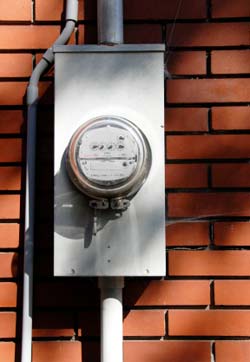The Occupational Health and Safety Act 85 of 1993 makes it compulsory for anyone who wants to sell anything including electrical wiring to comply.

The Occupational Health and Safety Act 85 of 1993 makes it compulsory for anyone who wants to sell anything including electrical wiring to comply. According to the Act, the individual should be in possession of a valid Electrical Certificate of Compliance (ECC).
According to the Act, the individual should be in possession of a valid Electrical Certificate of Compliance (ECC).
It is illegal for a seller to market anything that has electrical wiring without the necessary electrical certificate of safety.
This legal requirement also applies to real estate transactions, says Tony Ketcher, managing director Seeff Randburg.
Confusion often occurs because the Electrical Installation Regulations form part of the Occupational Health and Safety Act (85 of 1993).
In terms of this Act, property owners are ultimately liable to ensure that ECCs are obtained, that they are legal and that they have been issued by an appropriately qualified electrician, he says.
He explains that the Act is primarily concerned with the health and safety of employees in the workplace and as such many people believe that the regulations only apply to commercial property.
Regulations governing the ECC should be seen as a means of protecting not only the interests of employees but consumers, homeowners and the public in general.
The Electrical Installation Regulations specify that any owner, user or lessor of a building with an electrical installation should be in possession of a valid ECC, he says.
Ketcher says as far as the homeowner is concerned, the legislation and requirements are straightforward.
Before a home is marketed or sold, a complete inspection of all electrical installations is required by law.
An electrical installation refers to the set of wires and associated fittings, equipment and accessories installed in a home to convey, control and measure electricity use that is supplied by the local power utility.
To obtain an ECC, the electrical installation of a property should be tested to determine whether it is safe and complies with the current regulations.
The ECC assures a homebuyer that the electrical installations on a property or work performed on those installations comply with the current regulations and that the required technical standards have been verified by an appropriately qualified and registered electrical worker.
Ketcher says the certificate is an important part of the property transaction process.
All homebuyers are entitled to a valid ECC provided by the seller.
The seller may have to instruct an electrician to effect repairs to the installation before the ECC can be issued.
Failure to ensure that a valid ECC is available could compromise the safety of individuals and property and could result in unexpected and costly claims or electrical repairs.
If a householder does not obtain an ECC they remain responsible for ensuring that the electrical installations on the property are safe.
Should someone be injured in an accident relating to the electrical installations, the householder may be liable for both medical costs and damages and the resultant costs of having the installations repaired and re-inspected.
There are also several insurance implications in this regard, he says.
An ECC may only be issued by an accredited person. The Gauteng Electrical Inspection Authority (GEIA) is a public protection body.
GEIA's independence assures consumers that all installation work done by a GEIA approved electrician will meet electrical safety requirements.
In the current procedure of inspection, a visual inspection of all electrical installations is conducted followed by an inspection of non-visible installations, utilising instrumentation.
The report should specify and record all the components, positions and aspects of an installation.
Faults that do not comply with safety regulations are identified, and must be repaired and re-inspected before an ECC can be issued.
Information can also be obtained from the Electrical Contractors Association.
Apart from the legal requirements for electrical safety, government statistics indicate that incidents of electrical fires and electrocutions are on the increase and that a percentage of these are directly due to old or faulty wiring or installations, says Ketcher.

In the current procedure of inspection, a visual inspection of all electrical installations is conducted followed by an inspection of non-visible installations, utilising instrumentation. The report should specify and record all the components, positions and aspects of an installation. Faults that do not comply with safety regulations are identified, and must be repaired and re-inspected before an ECC can be issued
Many homes in South Africa are old and may have been altered many times over the years making it crucial for homeowners to check the condition of their electricity installations.
Even brand new homes can have incorrectly installed or faulty wiring.
All property owners should ensure that their electrical installations are safe and that they comply with the current regulations.
In most property sale agreements the seller undertakes to obtain a new ECC even where no alterations or additions to the existing electrical installations have been effected since the issue of a previous certificate.
An ECC remains valid and becomes transferable upon the sale of the property if there are no alterations or additions to the electrical installation.
The certificate should be retained by the purchaser to hand to the next purchaser should they decide to sell the property.
If any alterations were made, a new ECC would have to be issued for the additional alteration after a re-inspection of the electrical installations by an accredited person in terms of the Act.
A person who wants to lease a property can also request to see the ECC for the property before signing the lease agreement.
The lessor and real estate agent are obliged to produce the ECC on request.
Lessees should always request proof of Electrical Compliance before taking occupation of the rental property.
“Failure to produce a certificate will constitute a breach of contract and the affected party may recover damages or take any recourse that the contract or common law allows,” says Ketcher.
He says the estate agent needs to ensure that the clause is in the contract and that the seller understands his responsibilities in this regard.
The owner or seller of the building should be in possession of a valid certificate.
The estate agent merely acts on behalf of the owner regarding the selling and marketing of the property and therefore cannot personally be held liable.
He adds that estate agents need to ensure that owners have valid certificates of compliance before commencing with the marketing of their properties.
Readers' Comments Have a comment about this article? Email us now.
What perfect timing for your article! Inspected our "new" home in another town over the weekend and we were shocked to discover that the electrical certificate had been signed off and issued "without any problems"! Well... the tenants told us an entirely different story! Apparently you can only use one appliance at a time in the entire house - if the kettle is on, everything else must be switched off or the trip switch will go. One plate on the stove, and the TV must be off, etc. The current just is not "strong" enough to handle anything! The plug in the kitchen is notorious to "blow up your kettle", and the light in the toilet is hanging by a thread - bulb "attached" to wire. We took photos, got full details from the tenant and went straight back to the agent! She got hold of the electrician this morning who gave a million excuses as to why he said "all was well" when it so obviously is not! Thankfully the seller and agent are good and are going to ensure that everything is up to standard before we move in next month. But what scares me the most is what if we had not gone through to inspect the house and chat to the tenants? We would have only discovered the problems when we moved in and our appliances started blowing up, or even worse if it caused a fire or injury! We learned from experience of buying our first home how the electrician could pass sub-standard issues without blinking an eye and are now very cautious and thorough when making any further purchases - especially something as big and expensive as a house! Rather be safe than sorry with too many questions than too few! I shudder to think what could have happened if overlooked, and recoil in horror at the level of "service" with regards to such an important inspection! - Janet
The ECB is useless. I have phoned them on several occasion’ s “ Cape Town Branch and Eastern Cape Branch, with various complaints about my clients who have had properties signed off as safe but had not been inspected properly. The reply is that the onus lies with the owner. First of all what does the owner know about electrical installation to know if the electrician is not ripping him off? 2ndly where is the so called guarantee promised by ECA for contractors registered with them? We should go back to the days of the electrical inspector. The work was of a far better quality than it is now plus you have the benefit of an independent body checking your installation if it is new. I am still waiting for more than 2 years for ECA to come and check up on the complaints. I am a self employed, registered electrician, and would certainly not bother to register with the ECA unless I was forced to by law because I employed staff, as It is simply a money making racket, protected by the government. - Stephen









